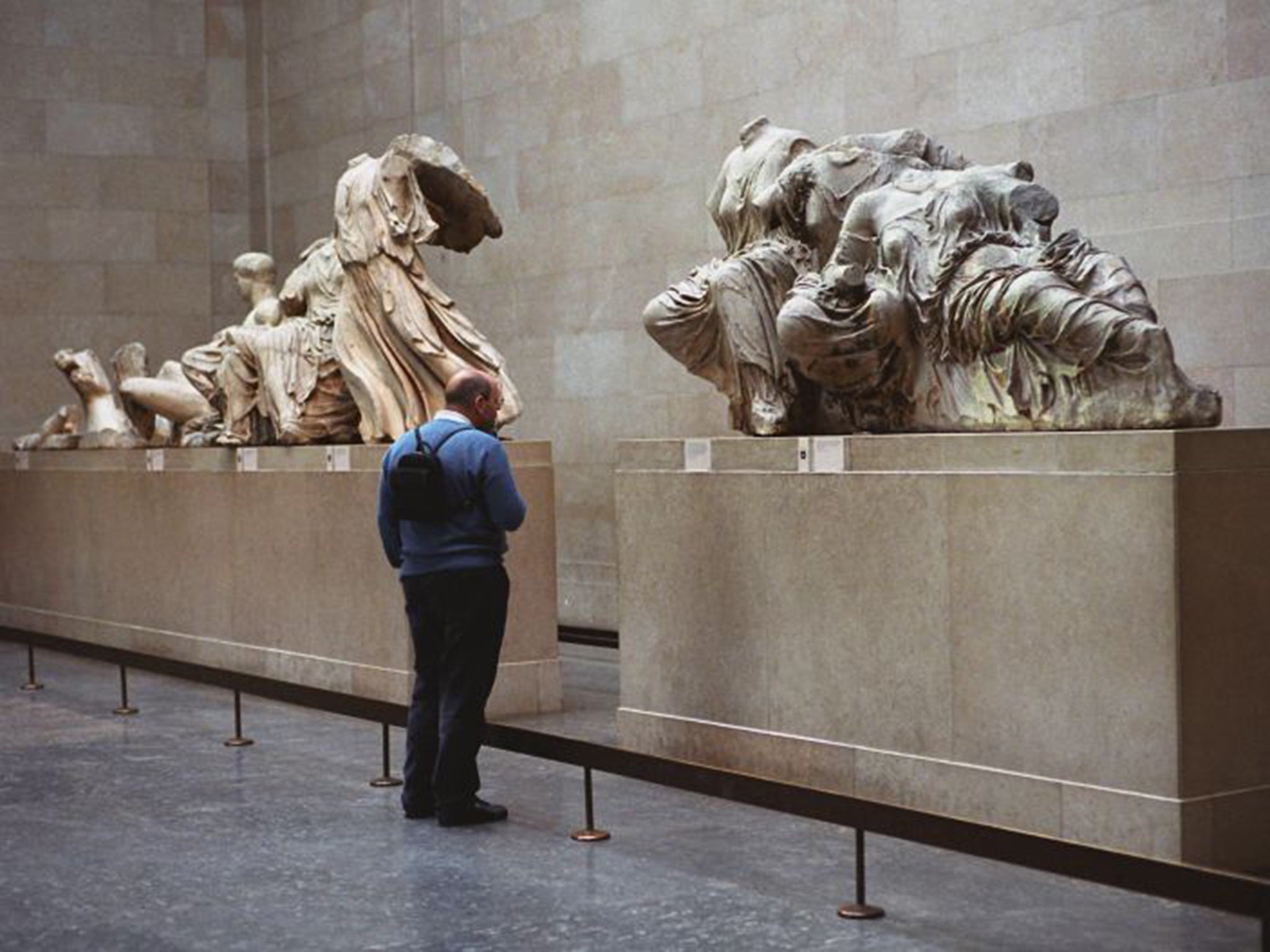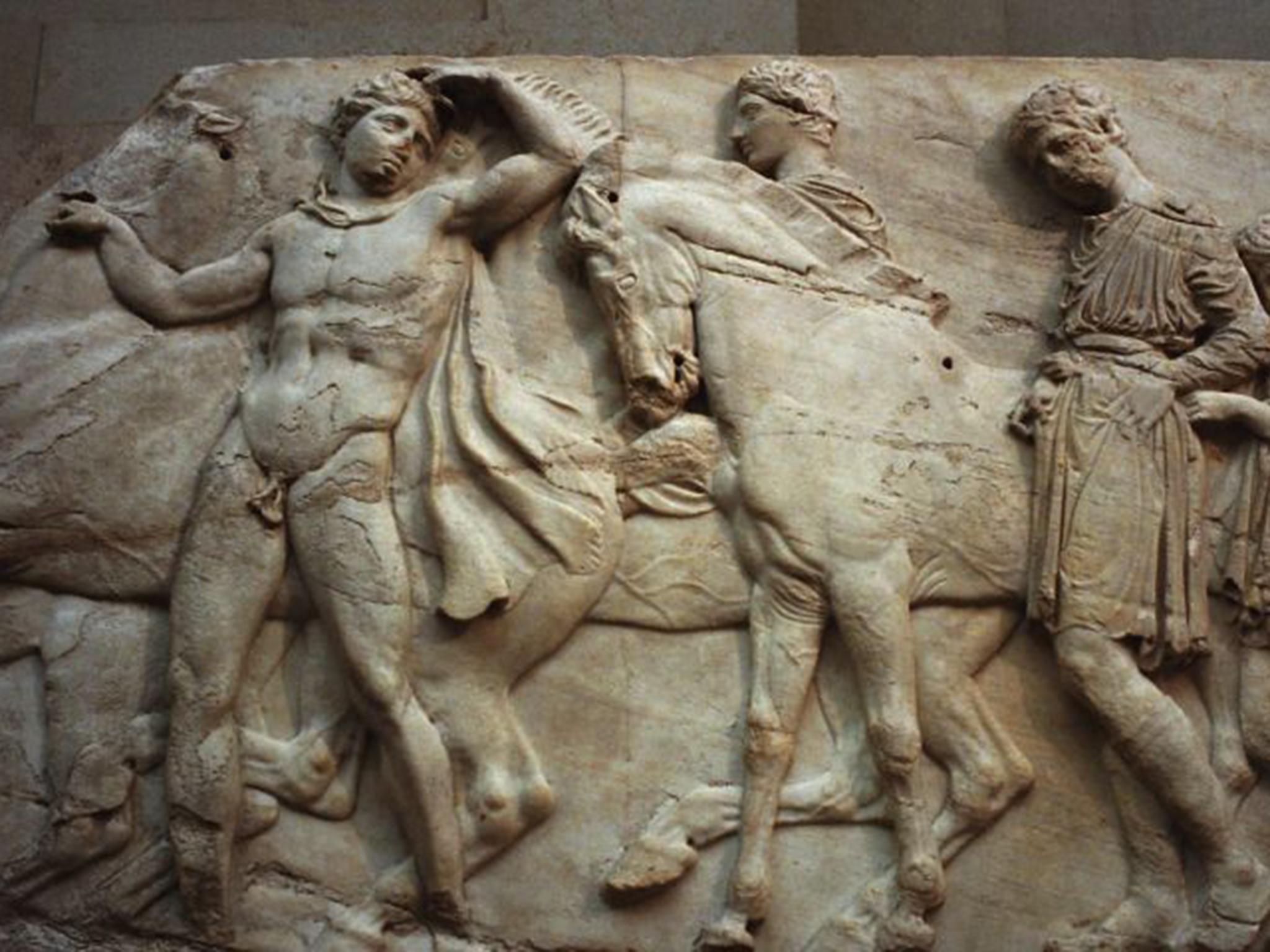Elgin Marbles row: Greece tells British Government to stop stonewalling on return of Parthenon sculptures
Athens prepares legal action over the UK's 'grubby' refusal to negotiate

Your support helps us to tell the story
From reproductive rights to climate change to Big Tech, The Independent is on the ground when the story is developing. Whether it's investigating the financials of Elon Musk's pro-Trump PAC or producing our latest documentary, 'The A Word', which shines a light on the American women fighting for reproductive rights, we know how important it is to parse out the facts from the messaging.
At such a critical moment in US history, we need reporters on the ground. Your donation allows us to keep sending journalists to speak to both sides of the story.
The Independent is trusted by Americans across the entire political spectrum. And unlike many other quality news outlets, we choose not to lock Americans out of our reporting and analysis with paywalls. We believe quality journalism should be available to everyone, paid for by those who can afford it.
Your support makes all the difference.The Government is refusing to negotiate with Greece about the return of the so-called Elgin Marbles despite a request to do so from the United Nations, a decision that could prompt Athens to begin legal action for the first time.
British campaigners likened the UK’s stance to “clinging on to stolen booty for dear life” and contrasted it with the “generous act” of returning the sculptures to help a friendly country on the brink of economic collapse. Youth unemployment has hit 50 per cent and suicide rates have soared amid a crisis so severe the Financial Times has warned Greece could turn into a “quasi slave economy”.
In 2013, the United Nations Educational, Scientific and Cultural Organisation (Unesco) invited the UK to take part in mediation about the marbles, created 2,500 years ago to decorate the Parthenon temple in Athens. Then last year it asked for a response by 31 March.
However a Government source said the UK “won’t be able to make any significant announcement this side of the [May] election”.
A motion calling for the UK to reply to Unesco and move to return the marbles is to be filed in the House of Commons on Monday.
The failure to respond in time could prompt Greece to abandon decades of diplomacy and take legal action, possibly in the European Court of Human Rights. A team of lawyers in London, including leading QC Geoffrey Robertson and Amal Clooney, wife of actor George, is preparing a “book-length” document setting out the options.
A source who has advised successive Greek governments said the main problem was finding a court to take jurisdiction in the case, but once that hurdle was overcome “then the lawyers are saying there is about a 75 to 80 per cent chance of success”.
The marbles are regarded as some of the finest works of art in history and a symbol of the birth of Western civilisation. Some sculptures were taken to Britain by Lord Elgin in controversial circumstances just over 200 years ago when Greece was ruled by the Ottoman Empire.
Dr Elena Korka, director of antiquities at the Greek Culture Ministry, said the central issue was “reunifying these exceptional, outstanding and most important sculptures, which belong as an integral part of a unique symbolic monument for the whole world”.
“This is the essence of it, making something which exists today as whole as it can be… this is what the public wants, every poll shows it. It’s such an important issue. Even if Greece didn’t ask for it, the whole world would,” she said.
She said if the British authorities relented it would be “a day of true joy, not only for the monument itself but I think for the value of the gesture for the sake of co-operation”. “It would definitely help the [public] morale. It would be a huge boost,” she said.
Asked about the prospect of legal action, Dr Korka said Greece was “still so much into the process of mediation that we’re not thinking of the next step”. “We haven’t exhausted the possibilities so let’s not go so fast,” she said.
She added that the UK’s silence since 2013 was “not so polite really”.
David Hill, chairman of the International Association for the Reunification of the Parthenon Sculptures in Australia, said there was a “growing appreciation even among people who are timid about the prospect of litigation that we have reached the point of last resort if this Unesco gambit fails. The diplomatic and political strategies of the last 30 years have not produced any progress at all.”

Polls have consistently showed strong support in Britain for returning the marbles. In November, a survey for The Times found there was a two-to-one majority in favour.
Andrew George, chairman of Marbles Reunited and Liberal Democrat MP for St Ives, said: “One of our friends is down on their uppers and we can offer something to them that might make their lives easier and give them a lift, which can only be good for their economy.
“It would be a generous act which would improve Britain’s standing in the world. At the moment we look rather grubby… like we are clinging on to stolen booty for dear life.”
He said he planned to lodge an early day motion in the Commons tomorrow calling for the Government to “demonstrate that Britain is prepared to... reunite these British-held Parthenon sculptures with those now displayed in the purpose-built Acropolis Museum in the shadow of the monument to which they belong, the Parthenon in Athens”.
The British Museum, which denies Elgin stole the marbles, argues that it “tells the story of cultural achievement throughout the world” and the Parthenon sculptures are “a significant part of that story”. It regards itself as “a unique resource for the world” with visitors able to “re-examine cultural identities and explore the complex network of interconnected human cultures” within its walls.
“The Parthenon Sculptures are a vital element in this interconnected world collection. They are a part of the world’s shared heritage and transcend political boundaries,” it says.
The Department for Culture, Media and Sport said it would “respond in due course” to Unesco.
Join our commenting forum
Join thought-provoking conversations, follow other Independent readers and see their replies
Comments